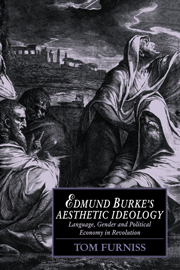Book contents
- Frontmatter
- Contents
- Acknowledgements
- Note on texts
- Introduction
- PART ONE AESTHETICS FOR A BOURGEOIS REVOLUTION
- 1 A theory not to be revoked: A Philosophical Enquiry
- 2 Labour and luxury: aesthetics and the division of labour
- 3 The political economy of taste: limiting the sublime
- 4 The labour and profit of language
- PART TWO REFLECTIONS ON A RADICAL REVOLUTION
- Notes
- Index
1 - A theory not to be revoked: A Philosophical Enquiry
Published online by Cambridge University Press: 18 February 2010
- Frontmatter
- Contents
- Acknowledgements
- Note on texts
- Introduction
- PART ONE AESTHETICS FOR A BOURGEOIS REVOLUTION
- 1 A theory not to be revoked: A Philosophical Enquiry
- 2 Labour and luxury: aesthetics and the division of labour
- 3 The political economy of taste: limiting the sublime
- 4 The labour and profit of language
- PART TWO REFLECTIONS ON A RADICAL REVOLUTION
- Notes
- Index
Summary
The first edition of Edmund Burke's A Philosophical Enquiry into the Origin of Our Ideas of the Sublime and Beautiful appeared in 1757. Its critical reception prompted Burke to publish a second and substantially revised text in 1759. In the introduction to his modern edition of the Enquiry, James T. Boulton informs us that although ‘each critic acknowledged the newness of many of Burke's assertions, and praised his perspicuity and provocative method of presentation … none fully accepted his theory’ (Boulton, p. xxiii). A good example of this is found in the most critical review which the first edition of the Enquiry received – that by Arthur Murphy in Johnson's Literary Magazine:
Upon the whole, though we think the author of this piece mistaken in his fundamental principles, and also in his deductions from them; yet we must say, we have read his book with pleasure: He has certainly employed much thinking; there are many ingenious and elegant remarks, which tho' they do not enforce or prove his first position, yet considering them detached from his system, they are new and just … (quoted by Boulton, p. xxiii)
The second edition of the Enquiry included a new preface, an introductory essay ‘On Taste’, and a section on ‘Power’, as well as additions which meet attacks on the theory by dogmatically reiterating the initial argument. In the new preface, Burke explains that ‘though I have not found sufficient reason, or what appeared to me sufficient, for making any material change in my theory, I have found it necessary in many places to explain, illustrate and enforce it’ (Enquiry, p. 3).
- Type
- Chapter
- Information
- Edmund Burke's Aesthetic IdeologyLanguage, Gender and Political Economy in Revolution, pp. 17 - 40Publisher: Cambridge University PressPrint publication year: 1993



